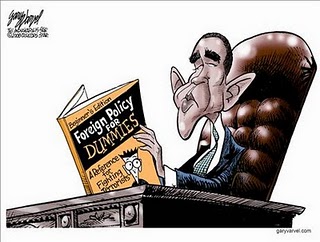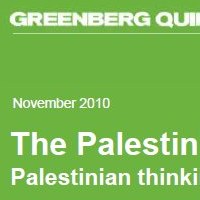![]()
Sun, July 17, 2011 | Rubin Reports | By Barry Rubin
Congress Gets Tough on Palestinian Authority; Obama Administration Doesn’t
The Associated Press reports:
“American aid to the Palestinians is in jeopardy over their ties to the terrorist group Hamas, unwillingness to restart negotiations with Israel and push for statehood at the United Nations over U.S. resistance, congressional Republicans and Democrats warned on Tuesday.”
But why is Congress taking the lead on this threat? Because the Obama Administration supports continued aid no matter what happens:
“Senior Obama administration officials insisted that the assistance — some $550 million requested this year — is critical to peace and stability in the Mideast and to boosting Palestinian security forces and the economy. They cautioned that cutting off aid would have serious repercussions.”
That does make sense in principle. But shouldn’t an aid cut-off be used as leverage to:
— Stop the Palestinian Authority (PA)-Hamas merger deal? Yes, it will probably fall apart on its own but without the U.S. government making a serious attempt to stop it.
— Stop the PA from throwing away all of its previous commitments and putting the United States in a corner by insisting on going to the UN with a unilateral independence proposal? If Obama vetoes it, this will be very damaging for U.S. standing in the Middle East and if Obama doesn’t veto it, the same applies.
— The refusal of the PA to negotiate seriously with Israel for 2.5 years?
“Our assistance to the Palestinian people is an important building block of our efforts to achieve a comprehensive peace in the Middle East that will allow all people there — Israelis, Palestinians and others — to live their lives in peace, in dignity and in security,” Jacob Walles, deputy assistant secretary of state for Near Eastern Affairs, told a congressional committee.
Yes, that’s absolutely true. But what happens when the assistance gets in the way of those goals because the PA refuses to negotiate on a comprehensive peace and systematically sabotages that effort? Shouldn’t the Obama Administration use some threats and leverage to win on the three points above?
Of course, this is typical, if you don’t protect your interests and merely give concessions then your interests will be trampled. As of now, the refusal of the administration to pressure or criticize the PA’s behavior is an important road block of “our efforts to achieve a comprehensive peace in the Middle East.”
Meanwhile, the Palestinian leadership blames the United States for everything wrong in the Middle East. So let me make it simple: The Palestinians blame the Obama Administration; the Obama Administration blames Israel and protects the Palestinians from criticism.
About the author,
Barry Rubin is director of the Global Research in International Affairs (GLORIA) Center, editor of the Middle East Review of International Affairs (MERIA) Journal, and Middle East editor and a featured columnist at PajamasMedia http://pajamasmedia.com/barryrubin/. His latest books are The Israel-Arab Reader (seventh edition), The Long War for Freedom: The Arab Struggle for Democracy in the Middle East (Wiley), and The Truth About Syria (Palgrave-Macmillan). The website of the GLORIA Center is http://www.gloria-center.org. His articles published originally in places other than PajamasMedia can be found at http://www.rubinreports.blogspot.com.



 RSS
RSS












Congress Gets Tough on Palestinian Authority; #Obama Administration Doesn’t | #Israel #PA http://bit.ly/npEzQn
Congress Gets Tough on Palestinian Authority; #Obama Administration Doesn’t | #Israel #PA http://bit.ly/npEzQn